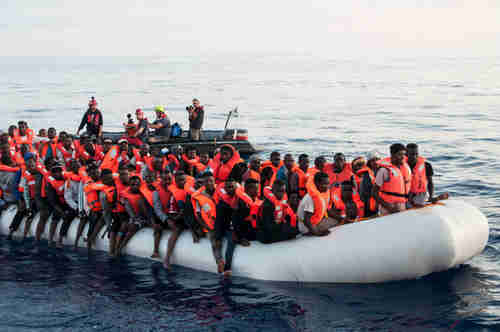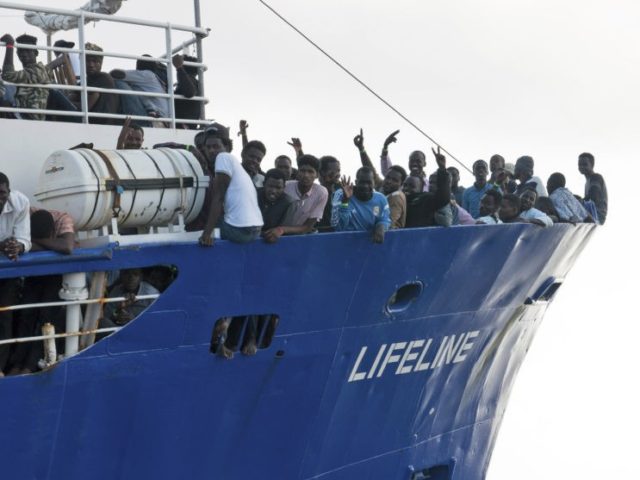This morning’s key headlines from GenerationalDynamics.com
- Desperate European Union considers ‘Disembarkation Platforms’ for migrants
- European Union very badly split on migration as Sunday’s summit approaches
Desperate European Union considers ‘Disembarkation Platforms’ for migrants

Migrants in the Mediterranean on Thursday (dpa)
Both the United States and the European Union are in the midst of total political chaos over the issue of migration and are desperately looking for ways to slow the potentially massive flood of migrants from Central America and Africa, as we described a couple of days ago.
In America, the administration has been experimenting with abandoning its “catch and release” program and keeping illegal immigrants in detention centers. This continues to be a massively divisive issue, especially related to the question of separating children from their parents. But there has been no clear statement that this will work, especially as courts and detention centers become flooded and overcrowded.
The Council of the European Union is considering a similar idea, though implemented differently. Migrants would be kept in detention centers, but the centers would not be on European Union soil. Instead, they would be in so-called “Disembarkation Platforms” that would be located in non-EU countries.
According to the EU draft document
1. The European Council reconfirms that a precondition for a functioning EU policy on migration is effective control of the external borders. Since 2015 a number of measures have been put in place to achieve that objective. As a result, the number of detected illegal border crossings into the EU has been brought down by 95% from its peak in October 2015.
2. The European Council is determined to continue and reinforce this policy to prevent a return to the uncontrolled flows of 2015 and to further reduce illegal immigration on all routes. Specifically as regards the Central Mediterranean route, efforts to stop smugglers operating out of Libya should be further intensified. The EU will continue to stand by Italy in this respect, and will step up its support for the Libyan Coastguard, coastal and Southern communities, humane reception conditions, and voluntary humanitarian returns.
…
4. In order to establish a more predictable framework for dealing with those who nevertheless set out to sea and are rescued in Search And Rescue Operations, the European Council supports the development of the concept of regional disembarkation platforms in close cooperation with UNHCR and IOM. Such platforms should provide for rapid processing to distinguish between economic migrants and those in need of international protection, and reduce the incentive to embark on perilous journeys.
Since there is no firm proposal, but only a draft document, possible hosting countries for these disembarkation platforms have not been officially named. However, unnamed EU officials have said that Albania (which is a European country but not a European Union count) and Tunisia have been suggested.
However, in response to a query about whether Albania would be a host, the European Council responded, “No. The regions are not yet identified as we are only talking about possibly exploring this concept.”
Tunisia has already rejected a similar proposal when it was made a few months ago. Tunisia’s ambassador said:
The proposal was put to the head of our government a few months ago during a visit to Germany, it was also asked by Italy, and the answer is clear: no!
We have neither the capacity nor the means to organize these detention centers. We are already suffering a lot from what is happening in Libya, which has been the effect of European action.
African countries that might serve as hosts include Algeria, Egypt, Libya, Tunisia, Niger, and Morocco. However, Dimitris Avramopoulos, the European commissioner for migration, said that no African country has yet agreed to host migration center. Politico (EU) and European Council Draft Proposal (PDF) and Balkan Insight and Guardian (London)
UPDATE: A leaked plan by the U.S. Navy reveals plans to construct sprawling detention centers for tens of thousands of immigrants on military bases in California, Alabama, and Arizona. Time
European Union very badly split on migration as Sunday’s summit approaches
Italy and Malta are refusing to take in 226 migrants on the Mediterranean rescue ship Lifeline, thus precipitating the in a continuing series of crises in Europe on migration. As of Friday evening, the Lifeline is stranded in the middle of the Mediterranean with no place to go.
Italy asked Malta to take in the Lifeline migrants. Malta refused, saying that it was too small a country to handle a large number of migrants. Italy said that Malta’s response was “inhumane.”
The EU has called for an emergency mini-summit meeting to be held in Brussels tomorrow (Sunday, June 24) to find a way to handle the migration issue, in advance of a major EU summit to be held on June 28-29.
However, Sunday’s mini-summit became controversial almost as soon as it was announced. Italy’s prime minister Giuseppe Conte had indicated that he would not be attending, but he agreed to attend after Germany’s Chancellor Angela Merkel spoke to him and apparently begged him to attend.
However, other anti-immigrant states including the Visegrad Group (Hungary, Poland, Slovakia and the Czech Republic) are staying away from Sunday’s meeting.
At a Visegrad meeting in Budapest on Thursday Poland’s Prime Minister Mateusz Morawiecki stated that “we don’t belong to this migrant-loving group of friends.” That is an interesting statement since it sounds like he is saying, “We don’t belong to the European Union.”
Even if Italy is represented at the meeting, the country’s new far-right interior minister Matteo Salvini has said that Italy will not be pushed around anymore.
Angela Merkel is facing the collapse of her governing coalition, and with it her entire government, unless she can come up with an EU agreement within seven days – and in particular, an agreement with Italy.
The crucial issue is that Merkel’s political opponent, Horst Seehofer, is demanding that Germany not take in any more migrants, or, if a new migrant arrives, he be sent back to the first EU country he entered. This is completely unacceptable to Italy, since that the migrants that come from Africa would almost always be sent back to Italy.
Horst Seehofer is not only the leader of the other party in Merkel’s governing coalition, he is also Germany’s Interior Minister. Seehofer has to power to issue an executive order that rejects refugees at the Germany border, and he’s making preparations to issue that order, which is opposed by Merkel.
If Merkel fails to reach an agreement at next week’s EU summit, then Seehofer will issue the executive order. That will be in direct conflict with Merkel’s policy, so Merkel will have to fire Seehofer as Interior Minister. That will cause the governing coalition to collapse.
Whether or not Merkel’s government collapses, the EU will face an existential crisis this summer if, as expected, hundreds of thousands of migrants cross the Mediterranean to reach Europe. Italy will not permit rescue ships to disembark, meaning that these ships will then head for France, Spain, and Holland. In addition, Italy’s new government wants to deport half a million undocumented migrants, many of whom are housed in squalid reception centers. More than 600,000 have reached Italy from Libya in the past four years. Euro News and BBC and AFP and Euro Intelligence
Related Articles:
- Europe and North America overwhelmed by growing migration crisis (21-Jun-2018)
- Italy’s migration policy opens up battle lines within the EU (17-Jun-2018)
- Italy begs for help after 12,000 migrants arrive in four days (30-Jun-2017)
- EU migrant crisis moves to Italy as Austria begins closing border (13-Apr-2016)
KEYS: Generational Dynamics, European Union, disembarkation platforms, Albania, Tunisia, Germany, Italy, Dimitris Avramopoulos, Malta, Lifeline, Angela Merkel, Horst Seehofer, Giuseppe Conte, Matteo Salvini, Visegrad Group, Hungary, Poland, Mateusz Morawiecki, Slovakia, Czech Republic
Permanent web link to this article
Receive daily World View columns by e-mail

COMMENTS
Please let us know if you're having issues with commenting.